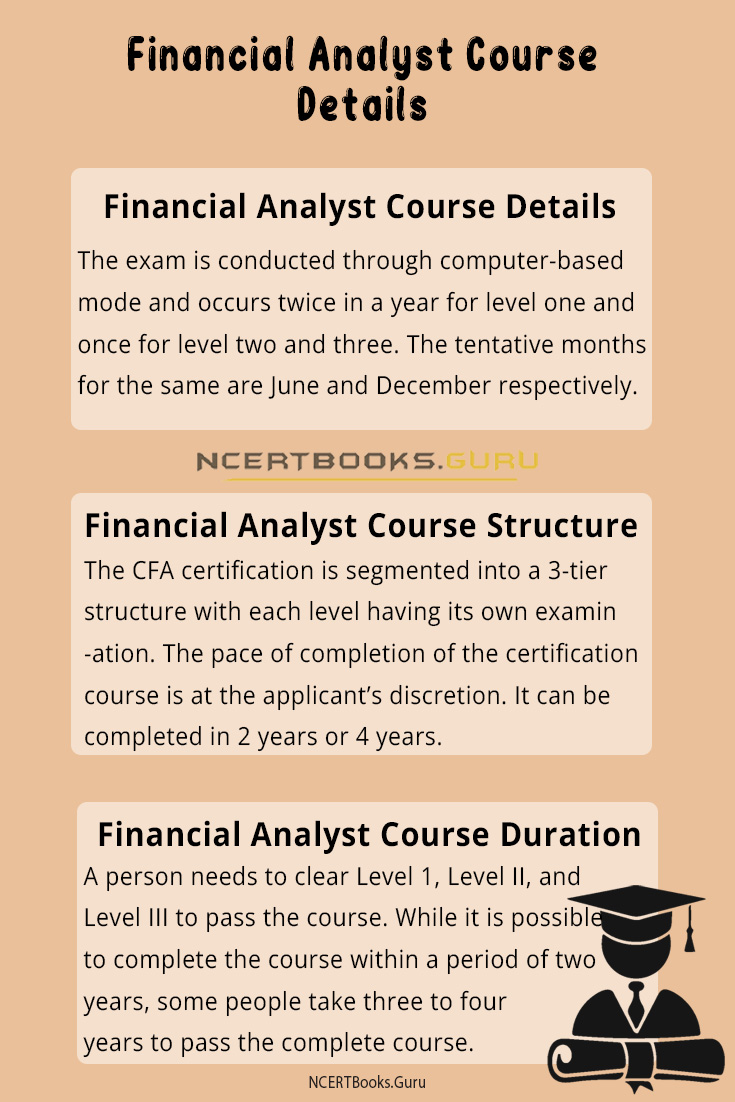Financial Analyst Course Details: In the world of finance and wealth, a financial analyst is a professional who studies data to come up with appropriate recommendations and solutions to tackle macroeconomic as well as microeconomic problems. They make well-researched predictions on business dynamics and study market trends to lay down business trajectories.
Now, let’s have a look at how you can study the course. Here are some Financial Analyst Course Details for you.
- Eligibility Criteria for Financial Analyst Course
- Financial Analyst Course Structure
- Financial Analyst Course Duration
- Financial Analyst Course Fee Structure
- Financial Analyst Job Opportunities and Scope
- Salary and Profiles Offered to Financial Analysts
- What is CFA?
- Does CFA involve pay hikes?
- Which exam is tougher, CA or CFA?
Financial Analyst Course Details
The exam is conducted through computer-based mode and occurs twice in a year for level one and once for level two and three. The tentative months for the same are June and December respectively.
It is conducted by the American organization CFA and is considered to be one of the most sought after certification in the financial and investment sector.
The exam syllabus is focused upon 10 major topics that are common to all the levels and only differ in the depth and difficulty of the subject matter. The areas of study include quantitative analysis, Financial reporting analytics, equity investment, Fixed Income Analysis, Economics, and Corporate Finance, among others.
Eligibility Criteria for Financial Analyst Course
The eligibility criteria for this course is a graduation degree in any field along with a necessary work experience of at least 4 years. Since the course particularly caters to topics ranging from finance to banking and wealth management, a commerce background will be beneficial to the applicant. Furthermore, a major in Economics, Statistics or Finance will be a perfect launchpad for this credential.
Financial Analyst Course Structure
The CFA certification is segmented into a 3-tier structure with each level having its own examination. The pace of completion of the certification course is at the applicant’s discretion. It can be completed in 2 years or 4 years.
The exam pattern is different for different levels. For the first level, the exam is conducted in two sessions of 120 multiple choice questions each.
For the second level, it is conducted in two sessions of 60 multiple choice questions each.
For the last level, the exam pattern includes 60 multiple choice questions and essay type questions.
Financial Analyst Course Duration
A person needs to clear Level 1, Level II, and Level III to pass the course. While it is possible to complete the course within a period of two years, some people take three to four years to pass the complete course.
Get to Know More about other types of Course Details Streamwise, and Category wise.
Financial Analyst Course Fee Structure
The fee structure depends on whether you do a late or early registration. Standard registration costs 1000 USD. A registered candidate gets to attempt all three levels and also gets access to CFA course material which is meant for self-study.
Financial Analyst Job Opportunities and Scope
Once you obtain a CFA certification, your scope widens to numerous sectors. Right from banking and investment to insurance and analysis, there are tons of opportunities and job profiles to choose from. Needless to say, with a certificate, you would always have an edge over your counterparts and would essentially enjoy a higher paycheck.
Due to rapid globalization, there has been an unparalleled increase in the demand for CFA professionals. Tier 1 companies always prefer hiring individuals with a CFA certification on their resume. CFA certification does not limit you to one country but paves way for a global career.

Salary and Profiles Offered to Financial Analysts
Some of the major job profiles and packages offered to CFA certificate holders are:-
- Chartered Financial Analyst (INR 9 LPA)
- Risk Manager (INR 10 LPA)
- Business Consultant (INR 10 LPA)
- Market Research Analyst (INR 7 LPA)
FAQ’s on Financial Analyst Course
Answer:
CFA is an acronym for Chartered Financial Analyst. A charter is typically someone who has passed all three levels of the course and has met other essential requirements.
Question 2.
Does CFA involve pay hikes?
Answer:
Pay hikes are indeed a part of the field. However, they are more radical and significant for senior-level posts than they are for entry-level employees.
Question 3.
Which exam is tougher, CA or CFA?
Answer:
While there is no concrete parameter to judge difficulty and it entirely depends on the one who takes the exam, the common perception has it that CA is harder.
